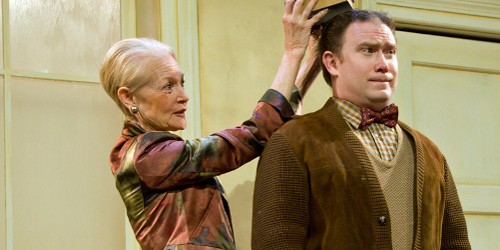By Carolyn Hayes

In terms of what it's about, playwright Jeffrey Hatcher's "Mrs. Mannerly" is an autobiographical retelling of the writer's childhood etiquette class and its wonderfully exacting, eccentric and enigmatic teacher. But such a paltry description falls humbly short of what the Tipping Point Theatre's current production is. Exuding a feather-light tone and sustaining an affable atmosphere of whimsy, this playfully comic reminiscence of a defining relationship, as directed by Quintessa Gallinat, resembles nothing so much as a short story brought to marvelous theatrical life.
The play's protagonist is young Master Jeffrey Hatcher (Peter Prouty), possessed of grace and comportment far beyond his nearly 10 years, who in 1967 enrolled in Mrs. Mannerly's Manners Class, a 36-year institution in little Steubenville, Ohio, still personally taught by its founder (Jennifer Weil). So entrenched is Mrs. Helen Anderson Kirk in her subject matter, she readily answers to the name "Mrs. Mannerly," leading both by example and by countless teaching moments in her every interaction. Jeffrey's reasons for studying a subject at which he already excels are "personal and private," but begin to take shape in the form of his perfectionist tendencies and inner sanctimony when he outperforms his handful of classmates (Tracy L. Spada, who singlehandedly populates the rest of the ensemble).
As the course goes on and the class size dwindles, two parallel stories entwine and drive the narrative. The first is a small, intoxicating mystery: Jeffrey stumbles across a biographical clue about Mrs. Mannerly, and she indirectly denies his roundabout inquiries. However circumstantial, the idea that a teacher of politeness would lie outright is like catnip for a bookish, indoors-y boy who loves emulating TV and movie hero types, and he becomes obsessed with learning her secret. The second plot concerns the arbitrarily important goal of scoring a perfect 100 on Mrs. Mannerly's never-aced final exam, a purpose that the teacher and her sole remaining student sweetly team up to accomplish, setting the tiny stakes dually high for a last push at relevance in changing times.
Hatcher's script dabbles in references to Vietnam and counterculture as well as a liberal peppering of foul language, not only delivering sure signs that gentility is on the wane, but also providing a willing entry point for the production's warmly nostalgic bent. Yet the show isn't longing for this or any particular era (some plops of casual racism intended to show their own outmodedness certainly see to that), but for that universally elusive and alluring world of one's long-lost younger self. To this end, designer Dennis G. Crawley has delicately erected a classroom of memory, whose unforgettable scuffs and comically small chairs are vividly reincarnated, and the rest given over to blank playing space and weathered indistinctness. Costumes by Colleen Ryan-Peters also lean into the subtle faded-Polaroid aesthetic, as well as the increasingly alien notion of "school clothes," but does reserve a pop or two of bright, chuckling 1960s trendiness.
The play's conspicuous strictures – chiefly the shape-shifting ensemble of one and the generously portioned narration – are seized as opportunities, and in every case Gallinat turns them into clear advantages. Doubling as the adult and child iterations of Jeffrey, Prouty is a charismatic wonder, leaping in and out of explanatory passages, and beautifully contrasting the toadying precociousness (and boyish voice) of a little gentleman against the wiser storyteller's delight of sharing his recollections and insights. Tasked with cycling through characters in plain sight, Spada employs physical and vocal elocution to highlight the blunt edges of the lesser secondary players, splendidly maxing out their drolly pessimistic, coarsely unimpressed, and hygienically repugnant characterizations. Hand in hand with these artificial elements and fantastical narrative leaps, the lighting and sound designs (by Joel Klain and Julia Garlotte, respectively) are ready for anything, plunging into imagination and unreality with an energy befitting Hatcher's lively recreation.
In all, though, these are multifaceted performances that faithfully honor the spirit of the piece. Weil in particular serves up a didactic sternness becoming the Mrs. Mannerly persona, then pushes through those limitations with generous moments of bite and pizzazz. Hers is a complex and perplexing character, and together, Weil and Prouty more than earn the audience's fondness and investment into the beguilingly evolving mentor/mentee partnership, sharing discoveries and payoffs as they occur on both sides.
A darling exercise in comic memoir, this "Mrs. Mannerly" builds up a heap of goodwill through spirited storytelling and the wistful humor of hindsight, and just keeps building on the strength of an influential and increasingly evocative central relationship. The combination of fond yet mischievous design, vigorous yet tender performance, and warm yet agile direction results in a show poised to amuse, envelop, intrigue, and charm.
REVIEW:
'Mrs. Mannerly'
Tipping Point Theatre, 361 Cady St., Northville. Thursday-Sunday through May 5, plus Wednesday, April 24. 1 hour, 45 minutes. $27-32. 248-347-0003. http://www.Tippingpointtheatre.com










